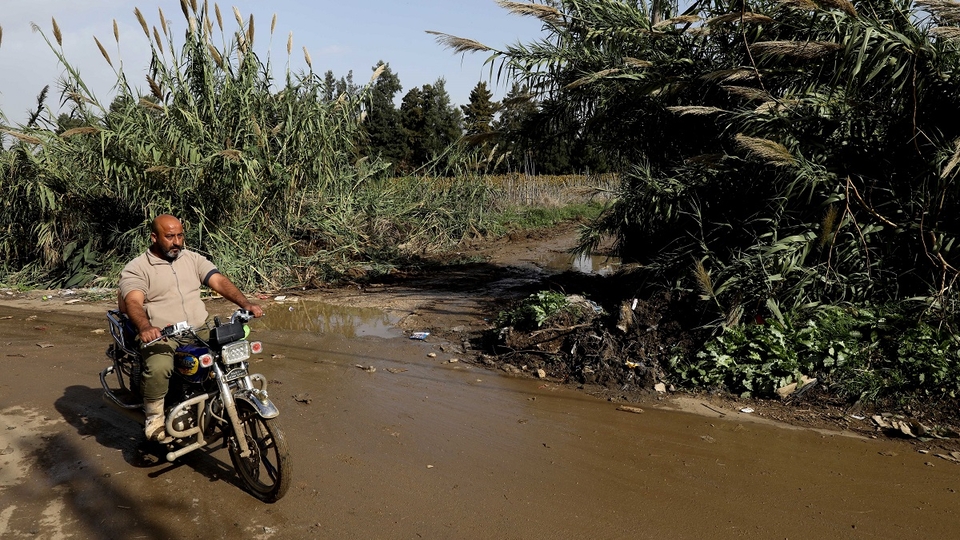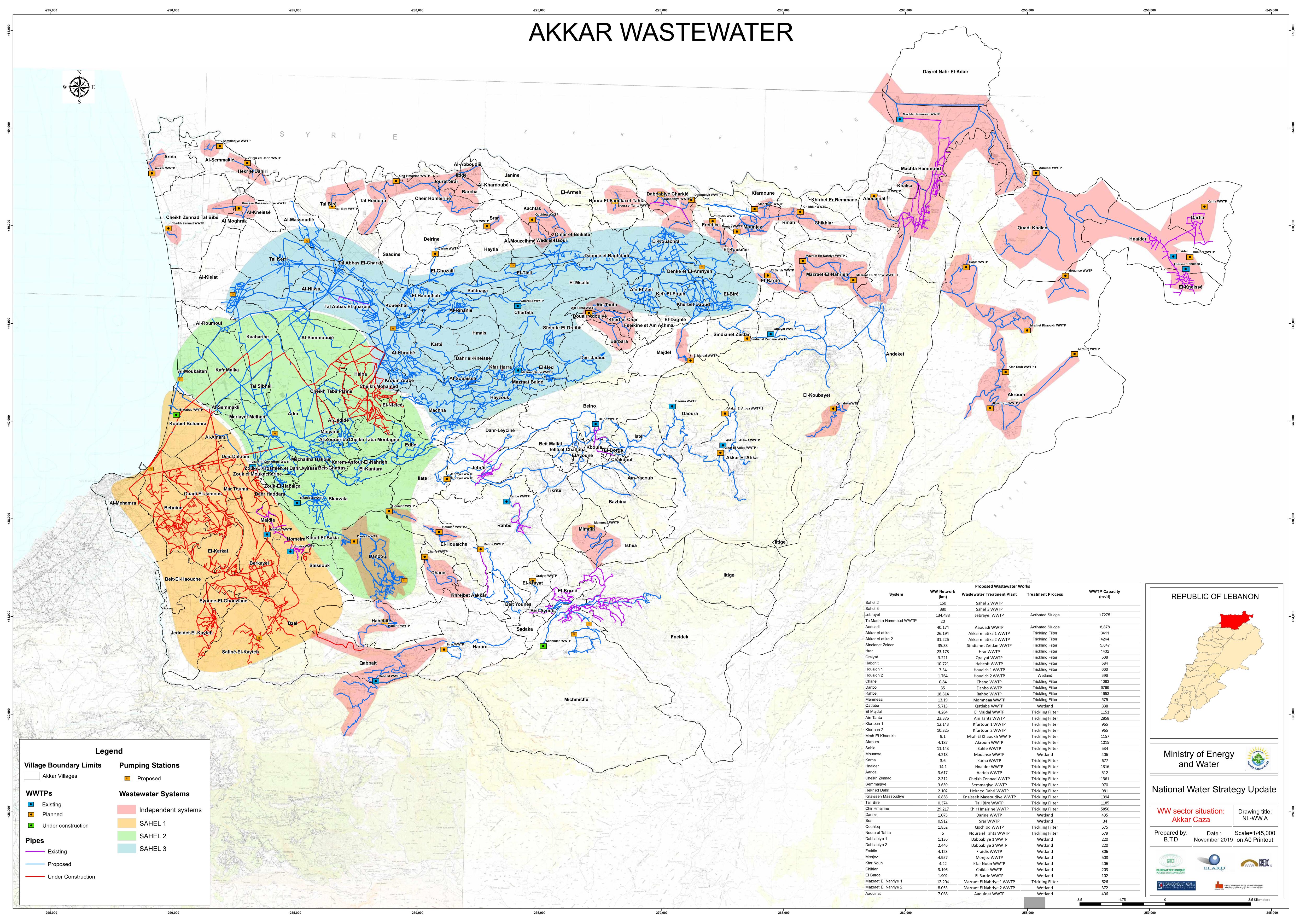From Flush to Crop: Akkar Farmers’ Desperate Use of Raw Sewage Water
This is Part 1 of a four-part series on water in Lebanon, covering its unsavory substitutes, its uses and misuses, the origin story of its crisis, and finally, its weaponization.
It is near dusk in Machta Hammoud, a rural village in northern Lebanon near the Syrian border. As I squelch through a muddy field, I feel a sticky mix of human waste and damp soil clinging to my shoes. I am standing alone, trying to catch the day’s last rays of sun. My colleague, photojournalist Marwan Tahtah, is taking photos of the sewage water that floods nearby farmlands.
Suddenly an old white pickup truck rumbles up. “Hey!” the driver shouts. “Who are you? What are you doing here?”
I brace myself. We drove three hours from Beirut, some 148 kilometers away, to find out more about the allegedly widespread use of sewage to irrigate crops here in Akkar, Lebanon’s northernmost governorate. This man could be linked to the local authorities; he might not like us airing their dirty laundry.
“Are you journalists?” He looks angry.
I nod, slowly approaching the vehicle with a smile that I hope will appease him.
“If you are a journalist, can you please write and tell people about our problems?” he shouts, shaking his finger at me. “Can you tell the world that we’re flooded with sewage? I’m coming back from my land now, winter has started, and the sewage flooded my entire crop — I don’t know what to do!”
“If you are a journalist, can you please write and tell people about our problems? Can you tell the world that we’re flooded with sewage?" —Saïd, Machta Hammoud resident
I ask him his name. “Saïd,” he says.
“Saïd, I promise I’ll tell everyone about this.”
His face relaxes. “Shukran,” he says, and drives away.
By the time we get back to our car, later that day, we notice our shoes are caked in mud and worse. We look for clean water to remove the filth, but the water, too, is dirty. Marwan tries to rub his shoes on some grass, but this requires stepping through sewage. Instead, we find a small dry patch on the muddy road, and try to clean our shoes in the dust.
“They Do It at Night”
Mohammad Madian Dandachli, a 44-year-old geography teacher, was born and raised in Machta Hammoud. He rented out his small plot of land until the COVID-19 pandemic, when he started planting peanuts, cucumbers, tomatoes, and lettuce.
One hot October night, Dandachli recalls, he noticed lights on some neighboring farmland. He didn’t think much of it: farmers are always around their lands, day or night. But after smelling a foul odor, he took a closer look. To his horror, he saw a thick black rubber pipe coming out of an opening in the muddy road.
The neighbor, he says, was watering his crops with raw human sewage. “They do it at night,” he says. “Because if people found out, they would talk, and no one would buy their crops.”
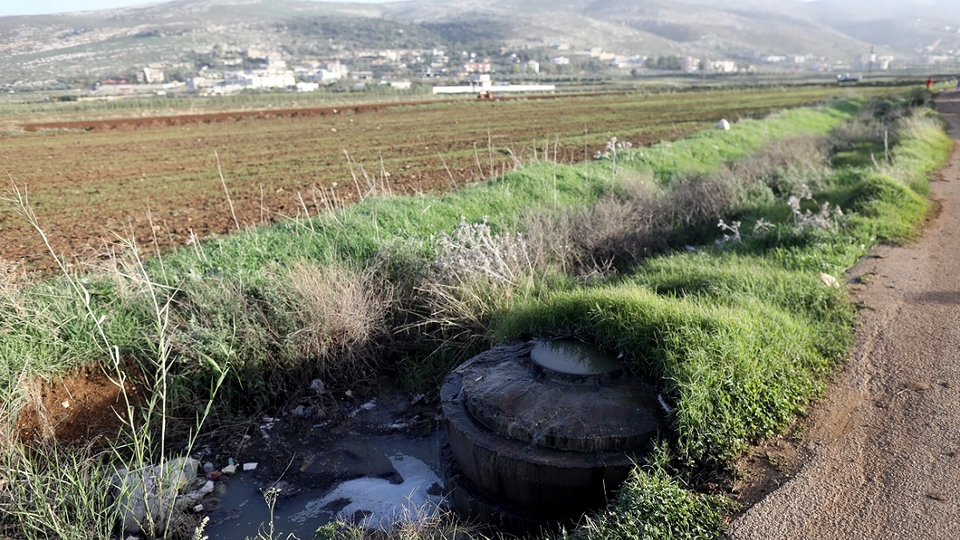
An open manhole pours sewage into the canal bordering agricultural lands in Machta Hammoud. Akkar, Lebanon. November 26, 2023. (Marwan Tahtah/The Public Source)
Akkar is Lebanon’s second-largest agricultural area after the Bekaa Valley. It is home to four main rivers — the Arka, Kabir, Ostuan, and Bared — and some of the country’s most fertile and productive lands. Akkar grows 14 percent of Lebanon’s produce, from peanuts and wheat to olives, avocados, and cucumbers. In the winter, it is Lebanon’s main producer of leafy greens like lettuce, coriander, parsley, and rocca.
It is also one of the country’s most neglected and economically deprived areas. In 2021, the UN Economic and Social Commission for West Asia (ESCWA) estimated that half of Akkar’s families lived in “extreme multidimensional poverty.” Sahel Akkar — the rich agricultural Akkar plain, which extends across the border into Syria — is one of the poorest areas within the governorate.
Akkar grows 14 percent of Lebanon’s produce, from peanuts and wheat to olives, avocados, and cucumbers. In the winter, it is Lebanon’s main producer of leafy greens like lettuce, coriander, parsley, and rocca.
And yet, since 1992, the Lebanese government and its foreign donors have poured tens of millions of dollars into Akkar’s wastewater sector, including more than $50 million from Council for Development and Reconstruction (CDR) projects alone. These funds were intended to build water treatment plants and sewage collection networks in Akkar. But all local farmers have to show for these millions are fields full of sewage and Lebanon’s first cholera outbreak in almost three decades.
Due to the central government’s longstanding abandonment of Akkar, the once-crystal waters of its streams and rivers, for millennia a vital source of irrigation, are now contaminated with raw sewage. Local farmers are forced to irrigate their crops with either contaminated river water or raw sewage, not out of malice but for lack of better options.
Local farmers are forced to irrigate their crops with either contaminated river water or raw sewage, not out of malice but for lack of better options.
Before the 2019 financial crisis, farmers in Akkar used to pump groundwater to irrigate their lands. But after the banks locked them out of their dollar accounts while the Lebanese lira plummeted, many farmers turned to Akkar’s rivers, Dandachli tells us. Despite being contaminated with sewage, river water became a popular alternative to expensive pumps, which require generators, spare parts, and fuel — all priced in dollars.
“People have a legitimate right to use river waters for irrigation, especially to grow large quantities of good-quality produce,” Ahmad Jahjah, an Akkar resident who works for World Vision, a global development and humanitarian aid organization, points out.
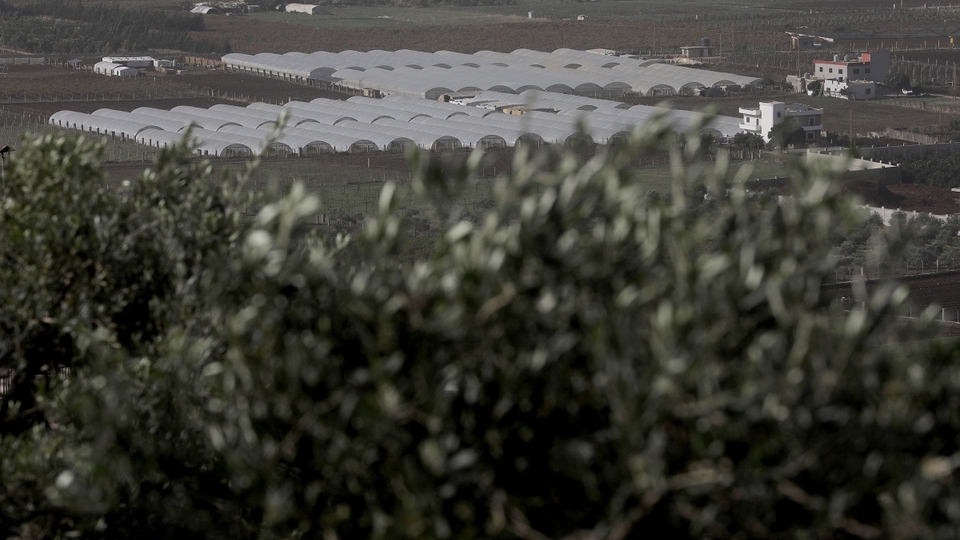
View of the agricultural plastic tents in Miniara from the top of a hill. Akkar, Lebanon. November 26, 2023. (Marwan Tahtah/The Public Source)
But dirty water can be deadly. In October 2022, Lebanon’s Ministry of Public Health (MoPH) found Vibrio cholerae, the bacteria that causes cholera, in sewage, irrigation, and potable water sources in Lebanon’s Akkar and North governorates. By June 2023, the MoPH had recorded 671 confirmed cases out of 8,007 possible cases of cholera, an acute diarrheal disease that can kill within hours if untreated. Twenty-three people died as a result of the outbreak.
Cholera spreads when people ingest food or water contaminated with the bacteria. If infected people don’t have access to clean water and sanitation facilities, they can easily pass it to others through untreated sewage. “If somebody is sick, whatever they have is going to end up in the sewage,” says Dr. Issmat Kassem, an assistant professor of microbiology at the University of Georgia’s Center for Food Safety.
Cholera is just one of many health crises in the north of Lebanon. Hepatitis A, a highly contagious liver infection spread through fecal matter, has been endemic in Lebanon for three decades. The summer of 2022 saw an upsurge of cases in the north – and not only of Hepatitis A. Akkar residents we spoke to also noticed a significant increase in chronic and life-threatening illnesses among their families, which they believe is caused by exposure to environmental toxins.
“We see the impact of the situation on people’s health, notably cancer and lung diseases. There isn't a single family in Sahel Akkar in which none of these illnesses exist.” —Ahmad Jahjah, Akkar resident
“We see the impact of the situation on people’s health, notably cancer and lung diseases,” says Jahjah. “There isn't a single family in Sahel Akkar in which none of these illnesses exist.”
In a 2021 study of river water in Lebanon, Kassem and other researchers found that 96 percent of the samples they collected from 14 different rivers contained fecal contamination. Between two thirds and three quarters of the water samples exceeded acceptable microbiological standards for irrigation. A third were too contaminated to swim in.
Another study the researcher worked on between 2021 and 2022 sampled vegetables grown in northern Lebanon. It found that 17 percent of the leafy greens sold in the Tripoli market district contained at least one parasite.
But despite the known risks, Kassem says Lebanon has inadequate safeguards to ensure people aren’t risking their health by simply eating food.
“Is anybody monitoring food safety for the consumer in Lebanon? I’m going to tell you no, no, no, no — it's a flat no.” —Issmat Kassem, microbiologist
The Ministry of Economy and Trade monitors food and water safety in commercial establishments that prepare and/or sell food, including bakeries, restaurants, and supermarkets. But an employee from the consumer protection department in the ministry, who asked to remain anonymous because they’re not authorized to speak to the press, tells The Public Source that the Agriculture Ministry is responsible for making sure that agricultural produce meets public safety standards.
“Is anybody monitoring [food safety] for the consumer in Lebanon?” Kassem asks. “I’m going to tell you no, no, no, no — it's a flat no.”
Deeply Rooted Neglect
Flies buzz tirelessly around us as we approach Khaled al-Masri, a farmer in Miniara. A deep rainwater canal runs between the road and his field, flowing toward the Mediterranean Sea. The dark, sludgy matter it contains reeks so strongly that I feel disoriented.
When I ask al-Masri if we could speak elsewhere, he invites us into a large plot of land filled with parsley. When I see the fresh green leaves, my first thought is that I would love to use them to make some tabbouleh. My second, however, wandered to imagine whether the parsley would taste as expected or if it might be tainted with the taste of sewage. I quickly dismiss this unsavory image from my mind and carry on with our conversation.
“The smell is really not that bad,” al-Masri says, with a grin. “You should come during the summer! It’s impossible to walk here because of the smell.”
He explains that due to the recent rainfall, some of the contaminated matter in the canal had drained into the sea. Sometimes, local farmers even divert river waters to the canals to accelerate the flow of sewage into the sea.
“What about the state?” I ask.
“The state?” al-Masri says, rolling his eyes. “What state?”
Water treatment plants are a much cheaper and safer alternative for irrigation than contaminated river water. Government-run treatment plants could turn sewage water into water that is fit for safe agricultural use, at an affordable cost for farmers.
But for Akkar to have functioning sewage treatment, it would first need to have a solid sewage collection system in place. As of November 2019, Akkar had 16 wastewater recycling plants, but most villages don’t have the pipes to transfer sewage to a plant. Only 62 percent of Akkar residents are connected to a public sewage system, compared to virtually all households in Beirut. Of the other 38 percent, nearly 30 percent use septic tanks, which often overflow. Another eight percent openly drain their sewage into roadside or rainwater canals, which end up in rivers and the sea. [note:1]
The roots of this neglect run deep. For Lebanon’s central government, Akkar has always been an afterthought — tacked on to Lebanon by French Mandate powers in 1920, this so-called “gateway to Syria” was ruled by semi-feudal landlords for decades. During the latter half of the 20th century, special interests began steering the Lebanese state away from agriculture and toward banking, real estate, and other non-productive sectors. This shift further marginalized Akkar.
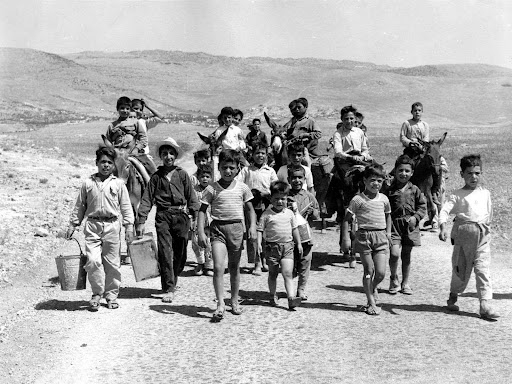
Did Lebanon ever really have a “golden era”?
Why did its economy shift to favor non-productive sectors?
Pierre Haidar, a resident of the town of Miniara, points to the homes built atop the gentle, rolling slopes of the Akkar plain. The homes overlook fields, olive groves, and grazing grounds. Their sewage, however, flows into open rainwater canals along the roadside. These, in turn, discharge directly into the sea or into the rivers — and then onto crops. “This means that farmlands are watered by their town’s sewage!” he says.
In 1999, researchers found that Akkar’s groundwater was heavily contaminated with nitrates from agricultural runoff, failing to meet international drinking water standards and posing a serious, multigenerational risk of disease. Researchers warned that failure to take action would result in future generations paying the price for current agricultural practices.
Akkar finally became its own governorate in 2003, but it took the central government another 11 years to appoint a governor. As of 2008, 25 percent of households in Akkar were still relying on artesian wells or private water networks dating back to the 1960s and 1970s, many of which have not been properly maintained since their installation.
Between 2011 and 2017, following Syria’s uprising and subsequent civil war, Akkar’s population increased by 40 percent. The region’s antiquated infrastructure has spectacularly failed to meet the needs of its rapidly growing population.
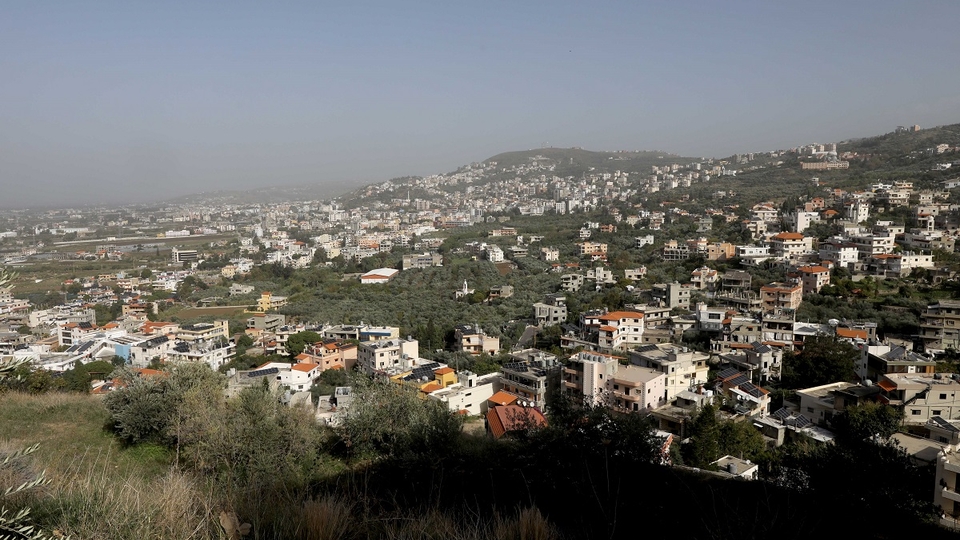
View of the rest of the town of Miniara. Akkar, Lebanon. November 26, 2023. (Marwan Tahtah/The Public Source)
Unfinished Projects
Between 1990 and 2021, the central government received $1.3 billion in foreign loans and roughly $200 million in grants earmarked for wastewater projects in Lebanon. Much of this funding was directed to the CDR, a public institution created by government decree in 1977, during Lebanon’s civil war, to oversee planning and contracting. Throughout its history, the CDR’s board and upper management has consisted of allies of Lebanon’s political heavyweights, including former prime ministers Rafik and Saad Hariri, as well as Speaker of Parliament Nabih Berri.
Between 2001 and 2020, the CDR issued $763.3 million worth of wastewater contracts nationally, according to government watchdog Gherbal Initiative. Our review of the CDR’s publicly available contract summaries, in addition to those published by Gherbal, found that, as of the time of publication, the CDR has awarded at least $79.40 million in contracts dedicated either partially or in full to wastewater management in Akkar since 1992.
The projects, funded by donors including the Islamic Development Bank, the Arab Fund for Economic and Social Development, and the Italian government, range from building water treatment plants to establishing wastewater pipeline networks. Some contracts include both wastewater and drinking water components.
Our review reveals that contractors have so far received at least $51.21 million under these agreements, with the remaining $28 million due to be disbursed upon the completion of these projects. Despite these significant outlays, however, the reality in Akkar points to a gaping disparity between ambitious plans and their outcomes on the ground.
The Akkar plain, says Jahjah, “is plagued by unfinished projects.” Even when completed, projects form a patchwork, failing to connect into a usable integrated whole.
The most expensive wastewater infrastructure contracts that the CDR has launched in Akkar, based on our review, is a $47.17 million contract awarded to Homan Engineering Company Limited to supply and lay more than 17,000 meters of sewer pipes and connect over 1,000 houses to sewage networks in Halba, Akkar’s capital, and three other nearby localities, according to the CDR’s description. Since 2017, $36.76 million has already been spent on the contract, according to the CDR, which notes the contract is proceeding “as scheduled” and is due to be completed by December 31, 2024. Since 2014, Gulf Spectrum has received $1.49 million for its consultancy and supervision services on the project.
"The Akkar plain is plagued by unfinished projects." says Ahmad Jahjah, Akkar resident. Even when completed, projects form a patchwork, failing to connect into a usable integrated whole.
Homan’s lead on the project, Imad Hawi, tells The Public Source that the company has delivered the project as stipulated in its contract. The CDR’s contracting portal showed the contract as roughly 75 percent done as of press time. The Public Source could not independently confirm the degree to which the project is finished.
But Hawi opines that the project itself is insufficient.
“We implemented the project completely and it’s closed, we have nothing left,” Hawi says. But because the project doesn’t include connections from the sewers to a functioning wastewater treatment plant, “no one benefits from it.”
In order for people to benefit from this project, Hawi says the state “needs to commit to new projects to take our line and connect it to the Qobbat Shamra station and the Qobbat Shamra station also needs to become operational,” adding that nothing is currently being planned.
“Maybe people will complain [about the project] because, in the end, we didn’t reach a destination. We reached a manhole on the plain and it’s closed and we stopped there…It was necessary to do this work. But to make this money worthwhile, and benefit Akkar, we need these two points: a line and a treatment plant.”
Asked about potential criticisms from Akkar residents who don’t see benefits from the region’s infrastructure projects, Hawi says: “I swear, I don’t know what to say to people. They’re right. What can I say? Even the places that have water treatment plants are not working. It’s a disaster!”
In other cases, projects that have a complete plan including both a treatment plant and a sewer network seem to struggle to come to fruition.
Between 2014 and 2018, the European Union funded a €15 million project to “improve infrastructure at [the] local level in areas most affected by the influx of Syrian refugees.” Under this program, in 2015, Irish humanitarian agency Concern Worldwide issued a contract for the design, construction, and temporary operation of a wastewater treatment plant in Machta Hammoud, along with the construction of a sewer network inside the village. But to this day, residents and experts say the plant is still not in service.
In response to a query on the project’s status, a Concern Worldwide representative told The Public Source that “the project is ongoing and we are actively working with all involved to bring it to completion as soon as possible.”
Naji Ramadan, the mayor of Machta Hammoud, says that the plant is not operational because it isn’t connected to the local sewage system. “The railways authority was opposed to sewage pipes passing through its lands,” he says, “so the work stopped for two years.” He added that the dispute was now resolved, and work was expected to resume in the spring. When we follow up on the status of the project in the spring, the mayor tells us that the work has not resumed, that the project is now under revision due to past mistakes, and that the wastewater treatment plant is still not operational.
Whether the railways authority approves a project in the lands it owns depends on its long-term ramifications for a possible railway, says Ziad Nasr, head of the board of directors of the railways authority. “We have no objection to building any facilities within the railway property,” he says, “as long as they do not conflict with the re-establishment of railway transport lines. With this approach in mind, we study the file and either give approval or give rejection.” Nasr says he’s out of the office and does not have the case file open in front of him and so he is not aware of the exact problems facing this project.
But until the government installs sewage pipes and connects them, the project will be connected to nothing — and sewage will continue to flow into fields. “How the heck can you build a plant that costs hundreds of thousands of dollars, that is not even connected to the sewage system?” says Dr. Kassem. “They’re just there collecting dust.”
“How the heck can you build a plant that costs hundreds of thousands of dollars, that is not even connected to the sewage system? They’re just there collecting dust.” —Issmat Kassem, microbiologist
On August 23, 2023, The Public Source, in partnership with government watchdog Gherbal Initiative, requested from the CDR access to the full contracts for projects related to sewage systems in the Akkar region. According to Law No. 28/2017, a state institution has up to 15 days to respond to such requests. The Public Source followed up on seven separate occasions since then; but at the time of publication, over six months later, the CDR has yet to respond.
The Public Source also reached out to two of the main project funders, the Islamic Development Bank and the Arab Fund for Economic and Social Development, asking whether they had received updates regarding the progress of their projects in Akkar. The Islamic Development Bank did not respond. The Arab Fund for Economic and Social Development redirected our queries to the CDR.
The CDR has a number of major contracts for Akkar wastewater listed as “under preparation” for future issuance, totaling $99.25 million
The CDR has a number of major contracts for Akkar wastewater listed as “under preparation” for future issuance, totaling $99.25 million, according to The Public Source’s tally. When we called a representative at the CDR to ask about the status of these projects, they responded that they are not allowed to give out any answers and that the only answer we can get is through a formal submission of a request to access information, all of which have been previously ignored. The CDR did not provide any further information about if and when these tenders might be launched.
Establishing Jurisdiction
Lebanon has four regional water establishments that are, at least on paper, responsible for managing drinking water, irrigation, sanitation, and sewage. In 2001, Law No. 377 transferred responsibility for wastewater management from various levels of local and central government, from municipalities to ministries, to the regional Water Establishments.
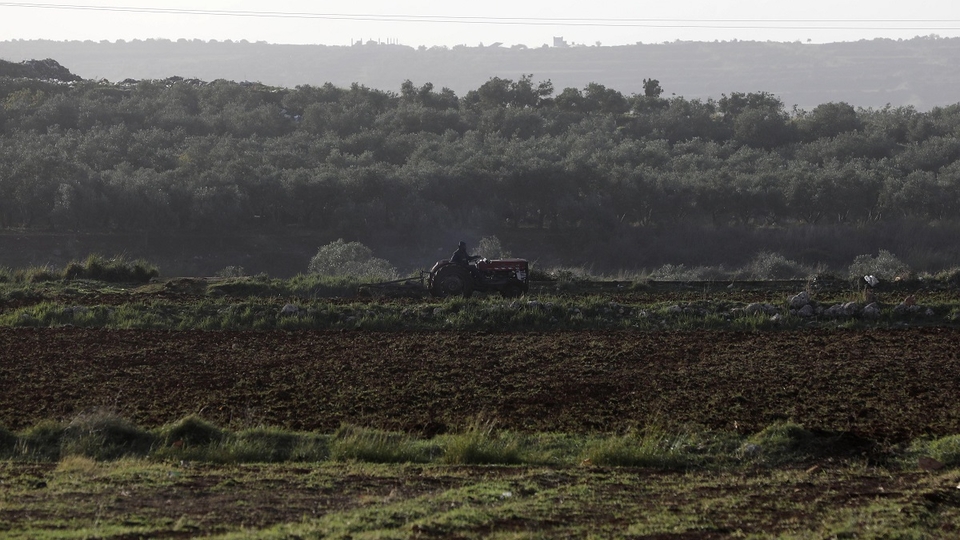
A tractor tills a plot of land in the village of Machta Hammoud, with olive trees in the background. Akkar, Lebanon. November 26, 2023. (Marwan Tahtah/The Public Source)
The CDR receives funds from foreign parties and hires contractors to do the construction. In theory, once the project is finished, the CDR delivers these sewage systems and water treatment plants to the water establishments for day-to-day operation. But in reality, administrative disputes between the CDR, municipalities and water establishments over ownership and operation costs of sewage networks continue to this day, as each tries to avoid taking on the considerable financial burden of running these services.
Gaby Nasr, head of the technical department at the North Lebanon Water Establishment, says Akkar does not presently fall under the NLWE’s jurisdiction. “The Akkar plain area does not fall within the scope of [NLWE] involvement yet, neither for water nor sanitation,” he tells us. “Meaning that the villages and towns located in the Akkar plain do not have the infrastructure needed for drinking water, irrigation, or sewage.”
The NLWE will not be authorized to work in Akkar until the transition from municipal control is complete, according to Nasr. Caretaker Minister of Energy and Water Walid Fayad, who has tutelage (supervisory) authority over the four regional Water Establishments, did not respond to a request for clarification on why the ministry has not transferred responsibility to the NLWE.
“There is no continuity in the work, on the contrary, if someone does something good, you will undo what they did, and start again from scratch.”—Ahmad Jahjah, Akkar resident
In comparison, Wassim Daher, the director general of the South Lebanon Water Establishment (SLWE), says that the CDR has been slowly transferring the operations of some of the treatment plants in the south to the SLWE, but that the establishment’s lack of funds means it struggles to afford the maintenance. As a result, only a few water treatment facilities are currently operating in southern Lebanon.
Water treatment plants require consistent power supply to be operational, Jawad Taher, water and development advisor and consultant, points out — a costly prerequisite for most of Lebanon’s water establishments and municipalities. “The treatment plants cannot be reasonably managed if we don’t fix these issues,” he says.
According to Taher, part of the problem lies with the parameters set by the CDR, meaning assumptions about the cost and reliability of energy, consumption of the population, seasonality, influent quality, land availability, etc., which are aligned with European or North American regulations. While having high standards is not wrong, it is also highly unrealistic in Lebanon, he argues, where the water establishments are woefully underfunded and understaffed, and “have no way of covering the operational costs.”
Only five of Lebanon’s 67 water treatment plants are fully or partially operational, a 2023 report by the nonprofit research and advocacy organization Legal Agenda reveals. The north’s largest treatment plant, in Tripoli, was only partially operating. It is supposed to be connected to Nahr al-Bared in Akkar governorate. But as of 2023, the connecting line was not completed.
“There is no continuity in the work,” says Jahjah. “On the contrary, if someone does something good, you will undo what they did, and start again from scratch.”
Of course, whether these projects will get carried out to completion is only one part of the picture. Until Akkar’s towns and villages have a network of sewage pipes to funnel their sewage to treatment plants, all of its multimillion-dollar projects will be connected to nothing — and sewage will continue to flow downhill.
“Not only do we irrigate with sewage water and dirty water, we even fight for it!” —Khaled al-Masri, Akkar farmer
In June 2023, Lebanon’s Ministry of Energy and Water (MoEW) and Ministry of Environment (MOE) launched an ambitious project, funded largely by the the European Union and administered by UNICEF, to get 11 of Lebanon’s water treatment plants up and running, as well as “promoting public awareness” of wastewater’s “impact on the environment and health.”
Akkar’s farmers are all too aware of wastewater’s impact on their health. But until the government gets its [----] together, they will keep using the contaminated water, even though they know the consequences. They have no other choice.
“Not only do we irrigate with sewage water and dirty water,” says Masri, laughing ruefully, “we even fight for it!”
—Additional reporting by Dana Hourany
With editorial support from Simon Assaf and Paul Cochrane
In Part 2 of this series, we follow the truckers who bring water to households when the government fails.
